- Home
- S J MacDonald
Karadon (Fourth Fleet Irregulars) Page 2
Karadon (Fourth Fleet Irregulars) Read online
Page 2
“Oh.” Tom could only watch as the techs finished what they were doing. They appeared to be working in silence, though they were almost certainly talking to one another, and to Buzz, through their suits’ comm systems. Once they’d connected it up there was only a few seconds before the box began emitting a high-pitched alert.
“Sorry,” said Buzz, and sounded genuinely regretful. “That’s DPC.”
“No way, no way!” Murg looked terrified again, now, floundering desperately for any way out of this. “You can’t tell that from a scanner! Test it! It’s got to be cindar!”
The forensics techs were, in fact, already opening the crate. One of them broke the quarantine seal and the other slid the door out and around to reveal the crate’s contents. It was packed full of brightly coloured boxes adorned with a dancing cartoon almond and all the usual product information.
At the sight of that, Murg gasped again. People running cindar or tetracitrine past Customs would not bother to package it like that. There would be no point. If the crate was opened, it would only be by the Fleet or Customs who would obviously test it anyway. If it was cindar, it should be in its own packaging from one of the many spice companies on Flancer. There were only two possibilities, here. Either Murg had been ripped off, sold a crate of genuine almond powder as cindar, or the contents of that crate had been packaged to look innocent for distribution groundside.
“It’s almond!” Murg cried out. “It’s really almond!”
“Sorry, but it really isn’t.” Buzz replied.
One of the forensics techs was sliding a laser probe into one of the boxes, puncturing a tiny hole and analysing a sample. The forensics techs looked at the probe readout, then one of them came to the hatchway, blank visor turned towards Buzz.
“Sixty eight per cent DPC,” he confirmed, activating external comms so that the owners heard it, too. “Cut with narcal. It’s raw Rainbow, sir.”
“No, no!” Murg looked as if she might pass out. “No!” She turned frantically to her husband. “I didn’t know! Tom, love! I swear! I didn’t know! I’m so sorry! Please, look at me!” She was tearful, now, reaching out to put a pleading hand on his arm. He jerked it away, ignoring her, all his attention on Buzz.
“I’m a fool,” he said. He looked and sounded exhausted. “I had no idea.” He heaved, suddenly, but managed not to actually vomit. “What happens now?” He asked, looking at Buzz with haunted eyes. He seemed to have aged twenty years in the last two minutes.
“I am placing you both under arrest,” Buzz said. There was some sympathy in his tone, but his manner was calmly official. “Your ship and its contents are now subject to seizure. There will be a thorough forensic examination and full inventory. It will then be Skipper von Strada’s decision whether you will be permitted to return on ship-arrest terms or whether you’ll remain in custody aboard the Heron until handed over to the authorities at Therik.”
As he was speaking, another armoured figure came onto the ship, carrying a couple of packets which it unwrapped and handed to them. “If you would, please, just put those on over your nightclothes.” Buzz requested. “We’ll provide you with kit aboard the Heron, and your clothes and personal belongings will be returned to you once the contents of the ship have been inventoried. Those are just to wear for the transfer.”
They had been given disposable coveralls with built-in shoes. Tom began putting his on at once, grateful for the small dignity of not being taken aboard Heron in his shorts.
“People make such a fuss,” Buzz observed, conversationally, “when we arrest people in their underwear.”
Fuss was not the word. The Fourth had been accused of mental and physical torture and human rights abuse over the way they’d arrested the skipper of the Might of Teranor. He had, his lawyer claimed, needed treatment for post traumatic stress because of the shock and fear he’d experienced that night.
The judge at his trial had dismissed that, along with other allegations of brutality, but had commented that ideally, the prisoner should not have been taken aboard the Minnow and put through processing in his underwear. In a subsequent interview, Alex von Strada had said that he would take the judge’s advice on that for future seizures.
“Tom had nothing to do with it!” Murg got up, too, shakily, though not putting on the suit they’d given her. “He didn’t know anything about it! I didn’t know it was drugs! You’ve got to believe me!”
“Oh, I do,” Buzz said. “I have no doubt at all that you bought it in good faith, believing it was cindar. I believe you that Mr Sutherland didn’t know anything about it, either. Unfortunately, though, you are in possession of a hundred and thirty kilos of a Class 3 prohibited drug, with Mr Sutherland’s name on the manifest. I have no choice but to arrest you both. And you have to know that your chances with groundside authorities are not good. There’s the principle of felonious intent, you see, the fact that you were intending to commit a crime, and the courts give no weight to “I thought it was harmless, I didn’t know it was drugs” either because every drug courier says that when they’re caught. And the skipper, of course, is in the frame regardless, on the principle of command responsibility. We’ll do what we can for you, but I can’t hold out much hope. All I can advise is that you give us, and groundside authorities, your full cooperation.”
“Yes. Okay.” She scrambled into her suit, then, grabbing at that fragile hope, almost frantic to show that she was cooperating. “I’ll tell you everything!” She declared. “Names, dates, everything! Will you let Tom off if I turn State’s Evidence?”
“That’s down to the Prosecution Service to decide,” Buzz explained. “The skipper can only make recommendations, and there’s no guarantee that the LPS will accept them.”
No guarantee, but they all knew there was a high probability. If anyone could make the League Prosecution Service accept that Murg had bought drugs unknowingly and that Tom had known nothing about it at all, it would be Alex von Strada.
“Can I talk to him?” Murg pleaded, tearfully. “Will I be able to see him?”
“Yes, of course,” Buzz assured her. “I’m sure he’ll talk to you as soon as he can. But we do, I’m afraid, have to go through proper procedures. So – Murgat Atwood, Tomas Sutherland, I am arresting you on evidence of possession of DPC. You will now be detained aboard the Heron for medical checks and processing. We do have to put you in cuffs for the transfer, that’s regulation. So if you could, please, turn around and put your hands behind you…”
Tom Sutherland complied, without saying a word and without looking at his wife. She was wiping tears away, stifling a sob as she saw Buzz putting tape-cuffs on her husband.
“I’m so sorry, Tom!” He didn’t even glance at her. Another little gulping sob escaped her as Buzz guided her round with a hand on her elbow and snapped tape-cuffs round her wrists as well.
“All right – come on, then.” They were each being guided by one of the suited figures, Buzz leading them through the airlock. “Don’t worry, we will take good care of you.”
It became apparent that there were two shuttles, double-docked to the airlock. They had to pass through one to go aboard the other. There were more people aboard the first shuttle, also in mirror-bright armour, three of them on their feet and the other at the pilot’s place. Buzz nodded to the three who were waiting by the airlock.
“Over to you.”
“Yes sir!” One of the three suited figures saluted, which looked very strange in the blank-visored suit. Her voice was that of a young woman. Any member of the Fleet would recognise that rapid salute and over-stressed “Yes, sir!” as what they called the Academy Yap. It was characteristic of cadets in training or newly graduated officers. Since it was unlikely that the Fourth would even have cadets aboard, still less assign one to carry out such an assignment, she was almost certainly a young Sub-lt.
Sub-lt Arie McKenna, in fact. Eighteen years old, keen as a bee, and still more than a bit mystified about why the Fourth had offered her a place.
Most of her classmates would have clawed through walls to get this opportunity. The others would have clawed through walls to avoid it.
“All right, dear girl.” Buzz didn’t salute back, but patted the arm of her armoured suit, gently amused. “On you go, then.” He gave a nod to the other two crewmembers, too. One of them was an experienced petty officer who’d handle things diplomatically if Arie McKenna got things wrong. That was unlikely, however. She hadn’t got anything wrong, yet, in all the hundreds of tasks they’d given her since she came aboard.
“Yes sir. Thank you, sir.” She grinned at Buzz through the suit-comm, demonstrating that she had absorbed some Fourth’s habits even if she hadn’t yet quite shaken off the Academy Yap.
Buzz grinned back, moving through to take the prisoners aboard the second shuttle. There was a pilot already at the helm there, too, holding the shuttle ready to launch.
“Just take a seat.” They were guided to separate seats, and their escorts sat down as well. Even in his anxiety, Tom noticed that this shuttle had been adapted to carry passengers in hullwalker suits, with wider seats than usual. Other than that, and the Fourth’s emblem above the airlock, it looked like a standard ten-seater Fleet shuttle. “We’ll be there in half a minute,” Buzz told them, and activated seat-screens for them so that they could see where they were going.
The image that appeared was of the deep space station, ISiS Karadon, surrounded by hundreds of orbiting ships. Karadon was huge. The disk-like superstructure was a luxury resort, twenty four levels of hotels, shops and just about every leisure facility known to man. The even larger structures beneath belonged to Karadon Freight, the biggest trading station in the League. Technically, it wasn’t actually part of the League. ISiS – Independent Space Stations – had the same status as if they were independent worlds.
ISiS Corps would not allow League authorities any jurisdiction on their stations. In fact, since the Senate had tried to get heavy handed with them about a hundred years before, they’d refused to allow League authorities even to come aboard. In the last few years, however, Karadon had become notorious as a centre of drug trafficking, piracy and laundering of stolen cargo, leading to increasing demand for the League government to do something about it. In the wake of the Fourth’s seizure of a container load of drugs destined for the station, there had been a hurricane of public outrage, angry debate in the Senate and a Presidential assurance that “decisive action” would be taken to address issues of law and order at ISiS Karadon.
That decisive action was now in orbit round the station. There were nearly five hundred ships at the station, orbiting in parking rings, but only one ship was riding in the eighth and furthest orbit. From a distance, it looked like a normal Fleet ship. It was a Seabird-class frigate. It was a Seabird-37, in fact, a class of ships being replaced by a more modern 38 generation. This particular ship, the Heron 37, had been laid up in the Fleet reserve, awaiting its replacement by the Heron 38 before it would be sent for scrap.
Four months ago, however, it had been pulled out of the reserve and given to the Fourth, upgrading them from their previous ship, the corvette Minnow as the Fourth had been transferred from Chartsey to Therik. The ship had gone into spacedocks for major refit work. The Fleet had refused to give any answers on what was being done, how much it would cost or when it would be ready. They had, however, confirmed that the Fourth was being assigned to patrol the Karadon region.
It was known that they had launched their ship the month before, heading out into space accompanied by the carrier Hermes. Spacers had been amazed even by that, since a Fleet ship would normally have spent at least a couple of months in port after a major refit, thoroughly testing and training on new systems before they put the ship through a launch. The Fourth had taken on more than eighty new officers and crew, too, so everyone had expected it to take months for them to be ready for deep space trials. There was no way, just no way, Tom thought, that they could be here already, recommissioned and on active service.
Yet there they were. As they approached the frigate, Tom could see the Fourth Fleet Irregulars’ emblem blazoned on the hull. It was lit up, which was only allowed if a warship was operational.
It was, Tom saw, just gone five in the morning. All space stations and starships in the League operated on 100 minute hour, 25 hour day Chartsey Central Time, so it was the same time on Karadon and all the ships around it. He and Murg had gone to bed around midnight and there’d been no sign of the Heron then. There was no chance he could have missed it. The arrival of the Fourth would have caused uproar. Was causing uproar. It might not have been obvious to groundsiders, but the rapid flickering of comms arrays on all the ships in sight made it clear that a lot of people were talking to each other very excitedly.
The exception to that was the Heron. They had new comms arrays, one of the few outer signs of the work that had been done on the ship. They were of a design Tom hadn’t seen before, an array of diamond-shaped transmitters. They were, however, inactive, other than for a standing signal broadcasting “off comms.” That meant that they would not respond to calls unless from an official source or someone on their approved caller list.
As they approached the frigate, a standard infopanel popped up on the screen. Amongst the information on it was the time at which the Heron had entered port. According to that, they had been here for less than a quarter of an hour.
As it sank in that they had come into port and gone straight for his ship, Tom looked at the blank visored figure of Buzz Burroughs. They had known exactly what they were looking for, right down to the manifest number of the crate. They had known that Murg had bought it as cindar. She had only brought that crate aboard two days before. That must mean that the Fourth had intelligence sources on the station, sources that had passed them detailed information about that crate as soon as they came into orbit.
Tom was still thinking about the implications of that as the shuttle thunked onto the frigate’s airlock. He and Murg were led aboard, still cuffed.
Tom’s first impression was that the ship smelt wrong. Every Fleet ship he’d ever been on had the same smell, a combination of standard-issue cleaning products and the chemical pine scent used in Fleet air processing systems. It was subtly unnerving to go aboard something that looked like a Fleet ship but smelt so strange. The air was warm and tinged with a spicy aroma. He could also smell coffee, real coffee, the scent of freshly ground beans wafting through the ship.
It was also unnaturally quiet. With the ship on operations most of the crew would be up, even at this hour of the morning. Tom would have expected to hear the background buzz of voices that was normal on Fleet ships. Instead, the frigate was silent other than for the low hum of machines. They had evidently been brought to a secondary airlock, the boarding lobby surrounded by closed doors and a high security hatchway.
The situation, however, was about to get a whole lot weirder than that. As soon as the airlock had closed behind them, their handcuffs were removed.
“Sorry about that.” Buzz Burroughs activated his visor so that they could see his face. Actually, it wasn’t a real visor. Hullwalker suits were designed to keep you alive on the hull of a superlight starship. Having a helmet with a visor you could see through was just not an option in an environment where you were contending with vacuum, freezing temperatures, lethal radiation, surging multidimensional force fields and the risk of micro-impacts that could punch through a metre of solid steel and even put a dent in duralloy. The wearer “saw out” through visual readouts inside the helmet. Finding that people worked better when they had at least the illusion of being able to see one another, however, designers always put a fake visor on the front of helmets, linked to a camera within so that the wearer could be seen and heard.
As soon as Buzz activated that, he became a lot less intimidating. He was around seventy years old – middle aged in a society which did not consider people elderly till they turned a hundred and ten, but older than the Fleet would normally allow for shipb
oard service. He had a friendly, good humoured face and looked as if nature had intended him to be a much-loved grandfather. “Welcome aboard, Lt Commander.” He took Tom’s hand and shook it before Tom quite knew what was going on, then did the same to Murg. “And CPO Atwood.” He smiled at their stunned expressions. “It’s all right,” he assured them. “We know you’re Fleet Intel.”
Chapter Two
Tom had to make a conscious effort to keep breathing. He and Murg had been working deep cover ops for more than a year, and only two people in the League were supposed to know that. This was an agent’s nightmare.
“Uh.” He was aware that Murg was looking at him, her own expression aghast in the moment before she forced it into a look of confusion. “I think there’s, um,” Tom had no difficulty at all in looking bewildered, himself. Then he broke off, even more overwhelmed as an officer came through the security hatchway. Fleet skippers did not come to the airlock to greet people unless it was an admiral or a president.
There he was, though. Anyone who’d watched intersystem news over the last year or so would recognise Shipmaster Alex von Strada. He was of typical Novaterran genome, of middling height, light build and fine boned, regular features. His eyes, frequently described as glacial, were a clear and piercing grey.
Nobody who’d seen him on the news, however, would have recognised his smile. Novaterre had a tremendously strong culture of unemotional behaviour in public, though they were just as relaxed and emotive as anyone else in private. That cultural background had worked well for Alex in the Fleet, where public dignity was highly valued, but it had worked against him in public relations. His one attempt to force a smile on camera had looked positively psychotic.
It certainly wasn’t being forced now, though, as he came to greet them with a look of warmly amused understanding.

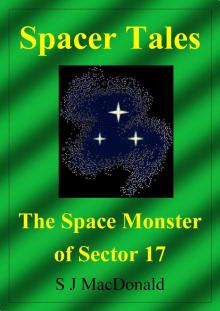 Spacer Tales: The Space Monster of Sector 17
Spacer Tales: The Space Monster of Sector 17 Spacer Tales: The Haunted Hatchway
Spacer Tales: The Haunted Hatchway Spacer Tales: The Lonely Engineer
Spacer Tales: The Lonely Engineer Spacer Tales: The Alien Monks
Spacer Tales: The Alien Monks Venturi
Venturi Spacer Tales: The Explorer
Spacer Tales: The Explorer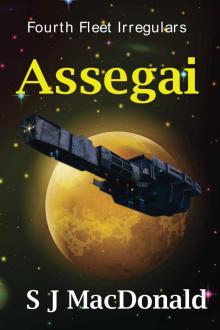 Assegai
Assegai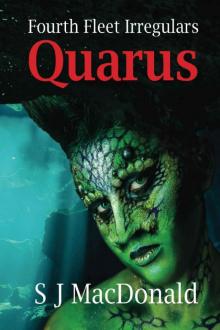 Quarus (Fourth Fleet Irregulars Book 6)
Quarus (Fourth Fleet Irregulars Book 6)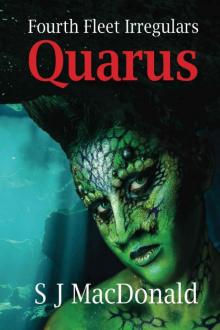 Quarus
Quarus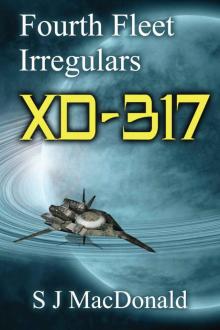 XD:317 (Fourth Fleet Irregulars)
XD:317 (Fourth Fleet Irregulars)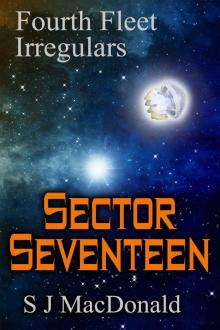 New Title 2
New Title 2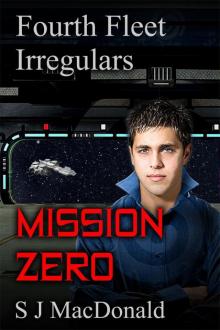 Mission Zero (Fourth Fleet Irregulars)
Mission Zero (Fourth Fleet Irregulars)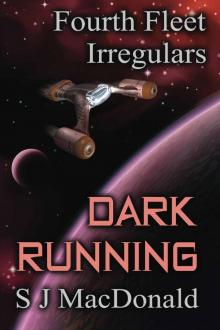 Dark Running (Fourth Fleet Irregulars Book 4)
Dark Running (Fourth Fleet Irregulars Book 4)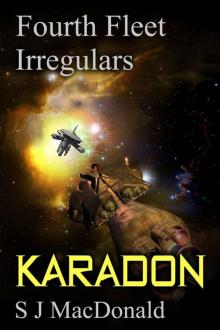 Karadon (Fourth Fleet Irregulars)
Karadon (Fourth Fleet Irregulars)